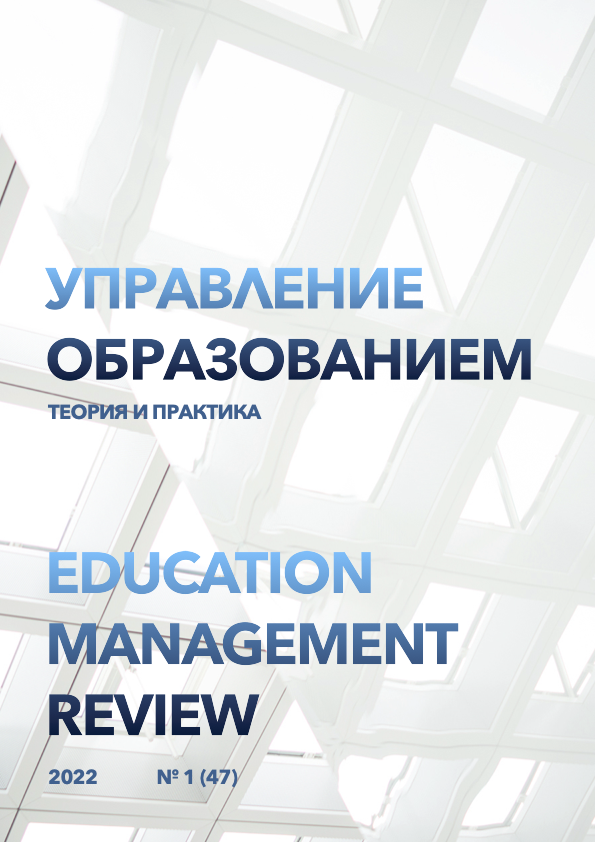Conceptual model of formation of the physical culture of the personality of the future teacher in the process of lifelong professional education
DOI:
https://doi.org/10.25726/a7509-6234-7839-yKeywords:
conceptual model, formation, physical culture of a personality, the process of continuous professional training, future teacherAbstract
The article discusses the construction of a conceptual model of the formation of physical culture of the personality of a future teacher in the process of continuous professional education. The formation of a person's physical culture is conditioned by the requirements of society for graduated specialists and is reflected in the legislative base of the Russian Federation. The formation of physical culture contributes to personal development, as well as the preservation and strengthening of health. The process of physical culture formation can be displayed using the developed conceptual model. It consists of five levels: goal setting (social demand for the preservation and strengthening of the health of the future teacher; the purpose of the study is the formation of a person's physical culture in the process of continuous professional education); methodological (theoretical components of the physical culture of the personality of the future teacher; implementation of the implementation of methodological approaches for conducting research; the formation of the spiritual component; the system of pedagogical influences for the formation of physical culture of the personality of the future teacher); content level (the basis consists of: organizational-pedagogical and psychological-pedagogical conditions, a system of disciplines; methods of forming the physical personality of a future teacher); structural - reflects the constituent elements of physical culture of the personality of the future teacher (physical education and a healthy lifestyle); final - shows the result of work on the formation of physical culture of the personality of the future teacher in the process of continuous professional training.
References
Безруков В. И. Проектирование управления педагогическими системами: методология, теория, практика : специальность 13.00.01 «Общая педагогика, история педагогики и образования» : диссертация ... доктора педагогических наук / Безруков Валерий Иванович ; Моск. пед. гос. ун-т. Москва, 2005. – 315 с.
Наговицын Р. С. Формирование физической культуры студентов в образовательном пространстве гуманитарного ВУЗа (на основе мобильного обучения) : специальность 13.00.08 «Теория и методика профессионального образования» : диссертация ... доктора педагогических наук / Наговицын Роман Сергеевич. Москва, 2014. 444 с.
Ожегов С. И. Словарь русского языка : около 100000 слов / под общ. ред. Л. И. Скворцова. – Москва : Мир и Образование : Оникс, 2012. – 1376 с.
Философский энциклопедический словарь / гл. ред. Л. Ф. Ильичев [и др.] Москва : Сов. энцикл., 1983. 839 c.
Berenbaum, S. (1995). Futures-oriented continuing professional education. Topics in Clinical Nutrition, 10(3), 66–70. https://doi.org/10.1097/00008486-199506000-00013
Brace-Govan, J., & Gabbott, M. (2004). General practitioners and online continuing professional education: Projected understandings. Educational Technology and Society, 7(1), 51–62.
Cervero, R. M., & Daley, B. J. (2010). Continuing professional education: Multiple stakeholders and agendas. International Encyclopedia of Education. https://doi.org/10.1016/B978-0-08-044894-7.00892-7
Dillon, C. L. (1996). Distance education research and continuing professional education: Reframing questions for the emerging information infrastructure. Journal of Continuing Education in the Health Professions, 16(1), 1–13. https://doi.org/10.1002/chp.4750160102
Hiok, O. M., & Haslinda, A. (2009). Framing programme planning practices in continuing professional education in professional associations in Malaysia. European Journal of Social Sciences, 8(4), 626–639.
Kaufmann, K., & Widany, S. (2013). Continuing professional education: Opportunity and participation structures [Berufliche Weiterbildung - Gelegenheits- und Teilnahmestrukturen]. Zeitschrift Fur Erziehungswissenschaft, 16(1), 29–54. https://doi.org/10.1007/s11618-013-0338-8
Kotlyarova, I. O., Voloshina, I. A., Volchenkova, K. N., & Batina, E. V. (2020). On-line education resources for the optimization of on-line continuing professional education. In Proceedings of the 2020 IEEE International Conference “Quality Management, Transport and Information Security, Information Technologies”,
IT and QM and IS 2020 (pp. 588–592). https://doi.org/10.1109/ITQMIS51053.2020.9322956
Kumar, V., & Gupta, D. K. (2016). Continuing professional education on digital library in India: A study. Annals of Library and Information Studies, 63(3), 203–214.
McCormick, G. (1994). Mandatory continuing professional education. A review. Australian Journal of Physiotherapy, 40(1), 17–22. https://doi.org/10.1016/S0004-9514(14)60450-5
Meyer, D. H., Hanks, W. D., & Olek, M. B. (2007). Continuing professional education in audiology: Who, what, and why. Seminars in Hearing, 28(1), 17–23. https://doi.org/10.1055/s-2006-958908
Stummann, C. B., & Gamborg, C. (2014). Reconsidering social science theories in natural resource management continuing professional education. Environmental Education Research, 20(4), 496–525. https://doi.org/10.1080/13504622.2013.833588




